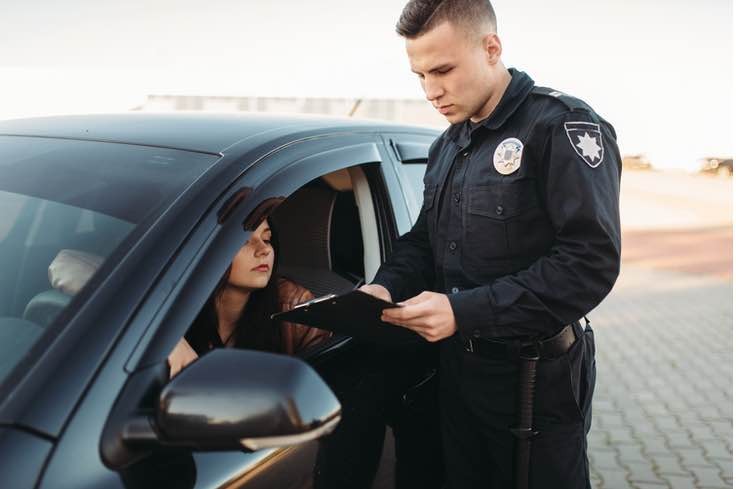You might be nervous about what’s going to happen when you get pulled over, but remember that officers are too; they never know what to expect. Generally, the more you do to help ensure the officer’s safety the more you ensure your own.
1. Look for a safe spot to pull over.
Check your mirrors, assess where you are (highway, side road etc.) and determine a safe place to pull over. Try to find a close parking lot or wide shoulder of the road, preferably well-lit.
If the area is heavily trafficked, it is acceptable to drive a short distance to locate a safe spot to stop. An example of this would be getting pulled over on a busy street, instead of stopping on the street to turn into a parking lot or less busy side streets. This is a safer location for you and the police officer who will be exiting his or her car. If you must cross multiple lanes of traffic to pull over, be sure flashers are engaged and move over at a cautious speed.
2. Slow down and activate your turn signal/flasher.
Reducing your speed and using the turn signal/flashers indicates to the officer that you intend to pull over within a reasonable distance.
3. Remain calm and roll down your driver’s side window.
Take a deep breath and calm your nerves. Roll down your driver’s side window, along with any windows which are tinted. If it is dark, turn on the interior lights. Make all your movements slow—the police officer is watching you carefully to make sure you’re not drawing a weapon or hiding something. Do not reach for anything in the passenger compartment of your vehicle or under your seat.
4. Place the car in park and turn off the ignition.
Once the car is in the park, wait for instructions from the police officer. Remain still, any suspicious movement from you (even a sudden lowering of one or both shoulders) can prompt a search. Keep your hands in plain sight, preferably on the top of the steering wheel with your fingers visible. Do not get out of the vehicle. Leaving your vehicle without being prompted by the police officer can be viewed as aggressive behavior.
5. Wait for instructions from the police officer.
When the police officer comes to your window, don’t speak first. He or she will usually ask for your license and registration. If you need to reach towards your wallet or glove compartment, notify the police officer before you make any moves. Do it slowly and deliberately. If you’re in a dark area, the police officer will follow your hands with his flashlight. Finish this process before anything else, then put your hands back on the wheel. While the police officer checks your license and vehicle status, keep your hands on the steering wheel.
Pro tip: Keep your glove compartment and center console well organized in preparation for moments like this, so you aren’t frantically fumbling around your vehicle.
6. Be civil.
Keep things respectful and do not argue with the police officer if you are given a ticket. You have the right to defend yourself in court if you feel you have been wrongly charged and that is the time to address any discrepancies. If you are given a ticket, instructions will be printed on the ticket for either paying the fine or the date on which your case will be heard in court. Answer the police officer’s questions the best you can. Just keep in mind that everything you say to a police officer is admissible in court. You can learn more about consent and search laws in Illinois here.
7. Sign the citation.
If a citation is issued the police officer will need you to sign it. Signing the citation is not an admission of guilt, but rather a recognition that you are the person who received it and plan to either pay the fine or show up in court (where you can dispute the fine).
In the case you are pulled over by police, remember to stay calm, move slowly, and follow the directions given by the police officer. You should also ask for proper identification from the police officer to confirm his or her identity. If you feel you have been wrongfully ticketed or pulled over, contact an attorney and/or go to court to dispute the citation.
During Get Drivers Ed’s courses, we teach teen drivers the importance of obeying traffic laws, but we also cover what to do if you are pulled over by the police.


